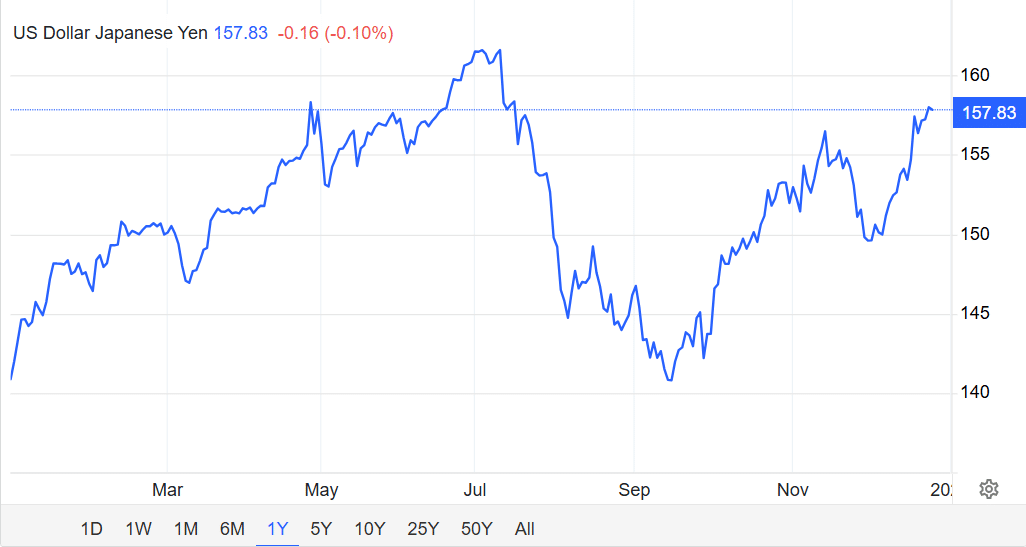- Bitcoin reserves have sparked intense controversy, with nations deeply divided on their potential.
- As Japan faces mounting financial strain, might its struggles present the proper case examine?
The talk over Bitcoin [BTC] reserves is dividing the market. Some see it as a vital hedge towards the greenback’s volatility, whereas others stay deeply cautious, involved in regards to the speculative dangers tied to it.
The divide is so sharp that even the Fed and the Trump administration are at odds, every taking a starkly completely different stance on the difficulty.
Now, Japan is becoming a member of the dialog, elevating concerns in regards to the potential dangers of together with Bitcoin in its overseas reserves.
However right here’s the catch: The Japanese yen has hit a five-month low towards the U.S. greenback, becoming a member of a rising record of G20 currencies struggling to maintain up with the greenback’s dominance.
So, will Japan’s cautious strategy to Bitcoin reserves be seen as a missed alternative? Or will this financial strain push Japan – and different nations – to lastly acknowledge BTC as a critical different?
Unraveling Japan’s financial storm in 2025
The current FOMC charge minimize triggered a ripple impact throughout markets, sparking an ‘sudden’ twist.
On the 18th of December, because the Fed’s determination made headlines, the U.S. greenback index surged to a staggering two-year excessive of 108.54.
The fallout was fast and brutal. Bitcoin plunged 14% in simply three days, whereas international currencies crumbled beneath the strain. The Japanese yen wasn’t spared, plunging to a five-month low of 158 per greenback.
In quick response, the Financial institution of Japan (BOJ) held its floor, maintaining rates of interest regular. However the true storm could also be forward.
The long-term impression of a surging greenback could possibly be far-reaching, with inflationary pressures set to climb.
The indicators are already right here. Japan’s annual inflation rate spiked to 2.9% in November 2024, up from 2.3% the earlier month, marking its highest studying since October 2023 – and it’s greater than only a quantity on a chart.
This inflation surge is a transparent sign of what’s to come back. Rising inflation, coupled with the sturdy greenback, is placing Japan in a tricky spot. Imports are rising dearer, squeezing each companies and shoppers.
All of that is unfolding towards the backdrop of Japan’s demographic disaster – an ageing inhabitants and declining start charges.
This shift is weakening the labor power, making the challenges of 2025 much more daunting.
So, are Bitcoin reserves the correct resolution?
The reply isn’t clear-cut – it’s each a ‘sure’ and a ‘no’. On one hand, Bitcoin’s restricted provide makes it a robust hedge towards rising inflation.
In contrast to the U.S. greenback, which could be printed at will, Bitcoin’s capped provide provides Japan and different economies a safeguard towards forex devaluation.
Nonetheless, there’s a major draw back. Bitcoin’s worth could be extremely unstable, making it a dangerous asset for a rustic like Japan, which values stability above all.
That stated, with Japan’s economic system dealing with growing pressure, the concept of embracing Bitcoin reserves will not be as far-fetched because it as soon as appeared. The truth is, it might quickly grow to be a necessity for financial resilience.
And this shift isn’t nearly nationwide economies. On a smaller scale, main exchanges are additionally stacking Bitcoin. As an example, Bitfinex’s Bitcoin reserve lately hit over $230 million, a stage final seen three years in the past.
As extra nations eye Bitcoin as a ‘security internet’ towards the rising volatility of worldwide markets, excessive liquidity is anticipated to flood the market, with exchanges readying for elevated demand.
Learn Bitcoin’s [BTC] Price Prediction 2025-26
So, whereas the U.S. greenback continues to dominate, many economies are trying to find alternate options. Bitcoin could possibly be the reply, however provided that its worth stabilizes within the 12 months forward.
If it does, the potential of utilizing Bitcoin as a hedge and even a mode of fee might not be a distant dream.




















